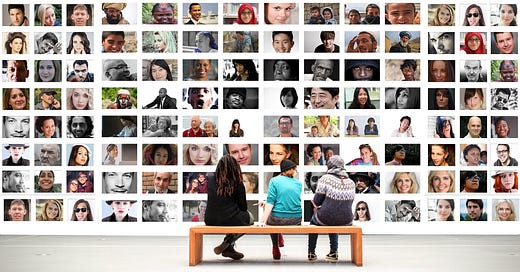2023: The year organizations get serious about inclusion?
Three key aspects I've been thinking about
Every once in a while, life throws an incredible surprise at you. That was the case for me last week, when I had the privilege of attending a Zoom call about organizational inclusion populated by several brilliant minds, most notably (for me) Dr. Tsedal Neeley of Harvard Business School and the truly inspiring Annie Jean-Baptiste, Head of Product Inclusion & Equity at Google. To say that I learned a lot from the insights they shared would be an understatement—my key takeaways from this session have been occupying my thoughts non-stop ever since.
The call centered around the ways in which large organizations should – and have recently found ways to – prioritize diversity, equality, inclusion and belonging. Heading into 2023, these are the ‘hot topic’ areas that a lot of organizations will be focusing on. ‘Tech’ is no longer the buzzword it once was, and we’re past the point of speculating on the nature of hybrid work—for those fortunate enough to be able to work remotely at least some of the time, that trend isn’t going anywhere. We know now not to blame workers for the Great Resignation, but to blame the shitty jobs they have left and are continuing to leave.
What organizations need to look at going forward, especially with increasing competition to hire and retain talent being sourced globally, is how to make sure everyone feels truly included in the discussions and processes happening in workplaces. I’d like to share the points the call raised for me personally, and why they resonate.
Key Takeaway #1: Inclusion really does benefit everyone
It’s tempting to think about organizational inclusion as being beneficial only to the groups of people being newly brought into the conversation. But over time, history has shown that innovations made with one specific group of people in mind have turned out to benefit lots of people, sometimes in unexpected ways. One of the concise and powerful examples Jean-Baptiste shared was the history of the curb cut. You know, the part of the curb that looks like this:
At one point in the not-too-distant past, these divots didn’t exist, and so curbs would effectively be insurmountable for people in wheelchairs. Hard to imagine now, but that’s how it was. And so, curb cuts were implemented, originally, to give people in wheelchairs easier access. But now who benefits from them? Lots of people! Kids on bikes, parents pushing strollers, and the old man who lives on my street and pushes a full-sized office chair in front of him whenever he leaves the house. (Love that guy. He’s always smiling and enthusiastic. Sometimes he’s got bags of groceries on that chair.)
Point is, changes made with kindness and accommodation in mind, no matter how large or small, end up potentially benefiting everyone.
No matter what your organization looks like, there’s no way that its products, services and workforce currently accommodate everyone adequately. Inclusion might not currently be a priority for your organization because you think the value-add targets too small a group of people. Chances are, though, that target group is actually a lot larger than it appears.
(And if you can think of other examples similar to the curb cut – liked closed captioning – please let me know in the chat!)
Key Takeaway #2: Inclusion is resource-intensive
This was the biggest eye-opener for me. No matter how well-intentioned your organization may be, or how serious it is about becoming more inclusive, the fact is that shifting priorities in order to become more inclusive might necessitate choosing to make less of a profit in the short term. And “making less of a profit” isn’t the kind of business plan that tends to get shareholders and board members excited.
Finding out how to better represent groups that are currently being under-represented? That takes time, research, and outreach—all of which come at a cost. You’ve got to be prepared to demonstrate the potential return on investment. Do we divert resources away from what we’re currently doing, thereby possibly lowering our current profit margin, in the hopes of increasing customer loyalty and nurturing a positive brand image? If so, what’s our timeline?
Even more importantly, though, is the need to look outside of your organization for the expertise you currently lack. If, for example, your current workforce is so homogenous that you’re starting to feel like you might secretly be at a never-ending Star Wars fan convention, and you want to look externally for first-hand accounts of what it feels like to be historically marginalized, you need to be able to compensate people for their time and expertise! Focus grouping is an important part of any R&D process, and the more you want to outsource (and you should want to outsource, if you want meaningful input), the more it costs.
Is your organization courageous enough to take a short-term hit, if it means achieving genuine inclusion in the long term?
Key Takeaway #3: Inclusion provides a real incentive to work
Here is where I get a little personal.
This may surprise you to read, but, sometimes working for a large corporation can feel a little soul-destroying. I don’t relish the image of bouncing a grandchild on my knee and telling them about all the quarterly KPIs I nailed on behalf of rich executives who would actively avoid making eye contact with me if we ever somehow found ourselves breathing the same air in the same room.
What motivates employees to stay committed to organizations? Especially when those organizations don’t always seem to have humanity’s best interests at heart? Work-life balance and flexibility can go a long way. Free booze, even longer. But the feeling that the organization is committed to genuinely improving the lives of people, even at its own expense?
Now you’ve got my attention.
I’m the guy who, in university, was the only white person in the Black history course I took. One of the only men in the feminist history courses. I volunteered with the Ontario Public Interest Research Group. For literal decades I have cared deeply about hearing the stories of people who have historically been born into less privilege than I luckily happened to be. I am committed to becoming a better ally for any groups that would choose to recognize me as one. Professionally, however, I don’t personally have the power to make a significant difference, though I try whenever possible.
But if I worked for an organization that I could see and feel prioritizing real inclusion? That wanted to educate me, and all of my coworkers, on how to be more inclusive, and why it’s important? Now that sounds like an organization I could stay committed to.






It's interesting to note that the companies I have worked for which felt very inclusive, unfortunately aren't around anymore. The inclusivity is definitely something that I miss, even though I now work <entirely> remotely on some very creative work, in the field I studied.
I prefer an environment where I can learn, am encouraged to ask questions outside of my role, and can build relationships with coworkers. You can learn so much from coworkers, and that is frankly missing in this remote world. I hope we can find a better balance.
At the end of every work day, I send the same copy-and-pasted email from my notepad to let my boss know what I accomplished said day. It never gets a response. Like I am one of Charlie's Angels; I get my task and complete it, without ever seeing or talking to anyone about it. Hello Charlie.